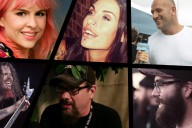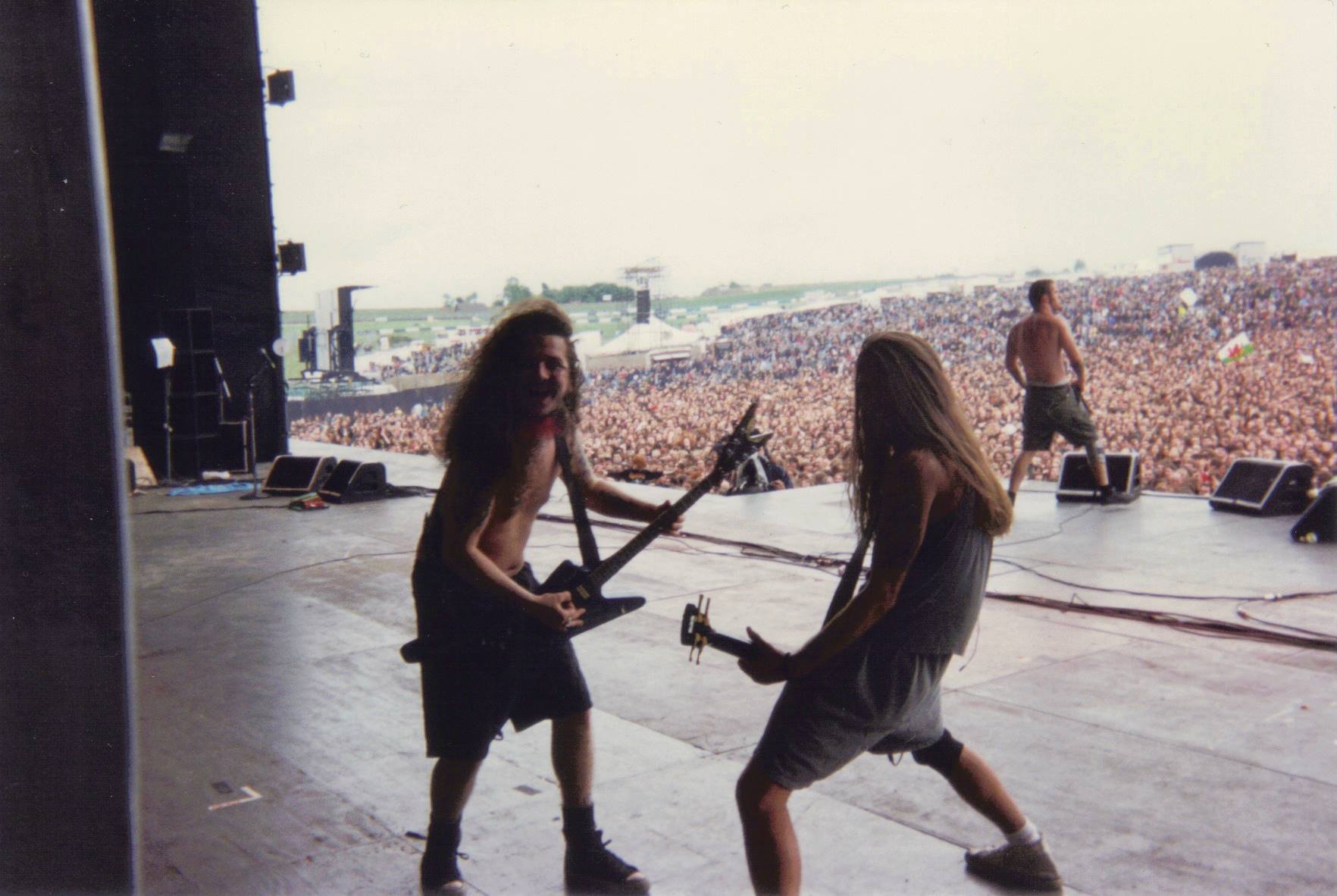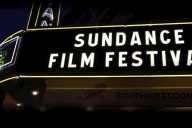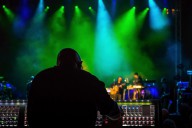So You Want To Book The Opera House? Meet Ben Marshall, Opera House/Head of Vivid Live
By christina · On December 2, 2015Ben Marshall, Head of Contemporary Music at the Opera House has just staged a series of concerts on the Opera House’s iconic forecourt steps that saw almost 50,000 fans take in incredible performances with one of the most spectacular backdrops in the world. He also programs the music for the annual lights and music Vivid Live festival and has had a pretty incredible ride from indie promoter taping posters to telegraph poles to booking a hand-picked selection of artists at one of the most unique and beautiful venues in Australia.
Name: Ben Marshall
Location: Sydney
Current Gig: Head of Contemporary Music, Sydney Opera House
Website: www.sydneyoperahouse.com/music
Social: www.facebook.com/sydneyoperahousemusic
www.facebook.com/vividlivesydneyoperahouse
www.facebook.com/GraphicFestival
How does it feel pulling off the shows you’ve just staged at The Opera House? It must be a buzz!
A wonderful buzz and slightly shattering – we just welcomed 47,000 people to that run of Forecourt performances from Chet Faker, Tame Impala and Florence + the Machine – it’s like I sneakily gave us another Vivid Live festival without looking. Playing on the steps of the Opera House is one of the grandest gestures the city can make for an artist and we’re enormously honoured these acts chose to perform here.
How did you get into your current gig?
I sometimes wonder. The short version is that I promoted drum + bass parties at uni and kept doing it. I became a lawyer to pay for moving the parties I was throwing in Perth to Sydney, quit law to work in phones sales at an indie-music distributor and after a couple of years convinced them to let me set up their touring company. I ran the touring company and figured out how touring worked, picked some acts on their debut Australian tours that ended up doing well like The National, The xx and Sia (there were less successful picks too) and sold a lot of performances to Sydney Festival. The Opera House saw the performances I was selling to Sydney Festival and asked if I’d like to come over and help them develop their contemporary music program and here I am.
What was your first job and how long did it take you to get into doing what you do now?
My first job was working as a field assistant for a mining company at 17, I’m 40 now so that’s 23 years ago and I’d say it’s been the last 10 years that have most pointed me in this direction, since I set up the touring division of the record distributor. But looking back I can see a thread of always heading towards and wanting to help advance the music that I loved.
Did you have a lightbulb moment where you knew this is what you wanted to do?
No, but I can look back and see all the things that got me here and when looking back, the direction of the gravitational pull of this kind of role seems clearer. I always loved music but never in a careerist fashion – I didn’t start a fanzine or intern anywhere to meet artists or industry folk or anything and never imagined working in music. I do remember going to London on a uni exchange when I was 21 and thinking ‘wow, all the things I like about the northern hemisphere like stimulating art, music, clothes, books – all, that stuff travels. And all the things I then suddenly realised I liked about Australia – nice people, good weather, beaches, a decent standard of living – all that stuff doesn’t. I thought “wouldn’t it be great to traffic in all the things I like about the northern hemisphere from Australia and mix it up with what’s great coming out of here?” Looking back that’s largely what I’ve been able to end up doing but it was by no means a plan. I can say I came back from London in 1997 absolutely lit up by amazing music and started writing for street press and promoting parties immediately on my return to Perth – in that sense a year in London was the lightbulb moment.
I do remember selling performances to Sydney Festival and seeing my artists play the City Recital Hall and thinking “Damn, this looks better than my show in Brisbane where I saved $200 on 3 par cans. This looks like the way to do it.” That valuing of the performance and the presentation of the art over the bottom line was enormously appealing, but also a very privileged position and I think comes with responsibilities. Walking up the steps of the Opera House to the job interview was really the moment where I went “ok, I really want this job.”
Who were the collaborators that made it most worthwhile along the way?
I got into promoting simply because I thought there was wonderful talent people ought to see. I was extraordinarily fortunate to start off promoting with an enormously talented DJ called Craig Shuard and we were just consumed by d+b – real Blues Brothers ‘we’re on a mission from God’ type stuff. We killed ourselves over our events but it was a much more useful channelling of excess youthful energy and enthusiasm than many others I can imagine. You need a huge amount of camaraderie and trust when for years your main concern is putting up your own money on events that are not making you wealthy and your weekends are Friday night radio til 1am, postering and glueing til 4am, sticking up polies from 11am-5pm, dinner, attend a gig, flyering afterwards til 3am, postering all day Sunday and then back to work. God I wish we had Facebook back then. Craig and I now both shudder at the sound of a stickytape reel going round a pole.
We inevitably burned out after about 7 years of this and I think Craig thought I was a bit mad to then go and try to make it a proper job. But the load is lighter when it’s not all your own money on the line. Ashley Sellers the owner of Inertia who I set up the touring company for was a huge encouragement right through the long weird beginning of figuring out from scratch how on earth touring bands around the country worked – promoters play their cards very close to their chest so no one showed me how to do anything – and Frazer Bourke who now runs Metropolis Touring was fantastic company and a godsend to me and that touring business right as we were getting to liftoff. Working with Fergus Linehan at the Opera House was also pretty transformative, cohering everything I’d put been putting together myself for years, moving from promoting to being an arts programmer, locating this work in a much broader, deeper, rationale and purpose and I now have an amazing Music team at the Opera House.
What were the biggest stumbling blocks you overcame?
Not having a clue what I was doing setting up the touring company and getting no guidance or able to call on anyone else’s experience – that was incredibly hard. I made lots of small experimental bets to try to watch how it worked but make sure I didn’t kill the business if my bets didn’t work and just slowly put it all together. Leaving law wasn’t that hard, I just couldn’t make myself keep doing it but looking back it looks crazier and crazier a thing to have done as the odds of success in any aspect of music are just so incredibly low. Balancing being a husband and a father of two is also a real and ongoing challenge, my wife holds down so much with our two gorgeous boys so youy get pulled in a lot of different directions.
What do you think are the personal qualities needed for your job?
This isn’t to say I actually have all these qualities in showroom condition myself but I’d list the personal qualities needed as something like – indefatigability, an ability not to take things personally, a sense of what your organisation/employer values and a genuine, passionate, discerning love of music that isn’t dented by constantly plugging it into a pragmatic, ruthless matrix of expected ticket sales, budgets and artistic impact and making decisions accordingly.
How much has the nature of your work changed over the years for you?
Everyone calls me back now I work at the Opera House. It’ll all change when I leave I’m sure but for now it’s really nice. If I’m to be serious, the biggest change is that the longer I’m at the Opera House, the greater the sense of responsibility of being in the service of something much bigger and trying to do justice to the opportunity and the building. For a temporary period, I get to contribute to this amazing place and I want to do a good job while I’m here.
What have been your proudest works that you’ve been a part of creating?
I’m very proud of this year’s Vivid Live, I’d not programmed a music festival before and that thing is a beast, it took absolutely everything I had to pull together. The Graphic festival I co-curate with Jordan Verzar is a real labour of love that I’m also proud of – there’s no other festival in the world that combines comics, animation, illustration and music the way Graphic does and the new works we commission end up onstage at places like Carnegie Hall, the Barbican and the Brooklyn Academy of Music. Getting Nick Cave to do his first Opera House concerts is also right up there.
Who have been your favourite artists to work with?
It’s very hard to choose favourites but here we go anyway – I chased The National so hard as an indie-rock promoter way back so to go from hauling them out here for no money in tiny rooms on their first Australian tour to staging two triumphant sold-out performances on the Opera House steps last year made me so happy. They’re wonderful people I regard as family.
What’s the best way to approach a promoter you admire? What should you NEVER do?
I’m not sure what to advise here – probably sincere flattery informed by detailed knowledge of their accomplishments and challenges they’ve faced coupled with you having actually accomplished something off your own bat that you can connect with what they do. But never let it fall over the vale into transparent obsequiousness or go the other way and overcompensate by being too-cool-for-school.
In your opinion, what is the best first question an assistant should ask on their first day?
How can I help?
What is the worst thing you could do on your first day?
Try too hard to ‘make a mark’ or be noticed and fail to watch closely and observe what the lay of the land is. Don’t make your first day about self-promotion, try to find out what actually needs doing.
What are the three most important lessons you’ve learned so far?
1. Everything you get and everything you keep in life is paid for somehow. You can pay for it with time, with money, your health, family, morals, friends, anything – but it will be paid for. Try to see clearly what it is costing you and then decide whether it is worth it to you.
2. When prioritising things, look for the one thing that could kill you. Then spend 90% of your time on that. Related point – separate the urgent from the important and then forget about the urgent.
3. Be kind, or at least as kind as you can manage under the circumstances.
What’s been your best “pinch yourself” moment so far?
Being able to contribute something to music I love, closely followed by hosting an on-stage conversation about Mad Max Fury Road with co-writers George Miller, Brendan McCarthy and Nico Lathouris.
What’s been the most unintentionally hilarious day so far?
Having to go on radio to talk about Morrissey’s meat-free stipulations because of the media firestorm they created.
What’s your ultimate goal, ultimate band, ultimate project? Has it already happened?
It’s to try and keep contributing to worthwhile and interesting art being created and presented to people who care about it. There’s much more to be done on this front.
What’s the biggest misconception in your opinion about the industry you’re in?
That it is or can be a normal career and that with time, effort, talent and persistence you will get somewhere. In a normal career someone who’s got 10 years more experience is 10 years better renumerated and higher up the ladder. However in industries like fashion, film and music where the supply of people who want to be a part of it massively outstrips the number of actual opportunities then things get weird. These industries take on the aspects of a knockout round tournament more than a normal linear career. Someone who’s been in the game for 2 years could be light years ahead of someone who’s been part of it for 20. It’s so fluid and changeable and I’m not sure that people who want to be a part of it clearly see this. There’s a great chapter in the book “Freakanomics” on this and I recommend reading it.
What’s the hardest part of the job, in your opinion?
Balancing your life and living up to the Sydney Opera House – it’s an impossible place to live up to but it makes you try hard.
What’s the best part of the job?
Contributing to making the city I live in more of the kind of place I want to live in.
For a young aspiring Australian dreaming of a job like yours what would you recommend they do first?
Try doing something yourself first before working for others and try to keep your love for the music close and use it as a compass to head towards trying to help what you think is great. The odds of success in music are low so loving what you’re working with is very important.
Please share a link to 3 music videos for bands you’ve booked and tell us why they and the song are important to you.
Nils Frahm – “Says”
German pianist/electronic producer wunderkind – I find this piece incredibly moving and the video is utterly hypnotic. The Opera House was the first place in Australia to present him and I think he’s a significant figure we’ll be listening to for many many years to come.
Neneh Cherry – “Buffalo Stance”
A fantastic pop song from an artist who still has more cool in her little finger than I have had, or will ever have, in my entire body. She had never played Australia before this year and we were very proud to present her first ever performance in Sydney at our place. Her latest record with Four Tet is marvellous and Massive Attack’s ‘Blue Lines’ probably wouldn’t exist without her funding and support. She’s a great.
Caribou – “Our Love”
I absolutely love turning the Opera House Concert Hall into one giant bassbin and no-one, not even Amon Tobin, has more thoroughly converted that space into a charging smoke-filled nightclub circa 3am than the mathematical wizard Dan Snaith, aka Caribou. This track is gorgeous and so is the vid – I am dying to have him back.
Interview by: Christina Rowatt. Follow Christina on Instagram.
Photos by: Daniel Boud.






